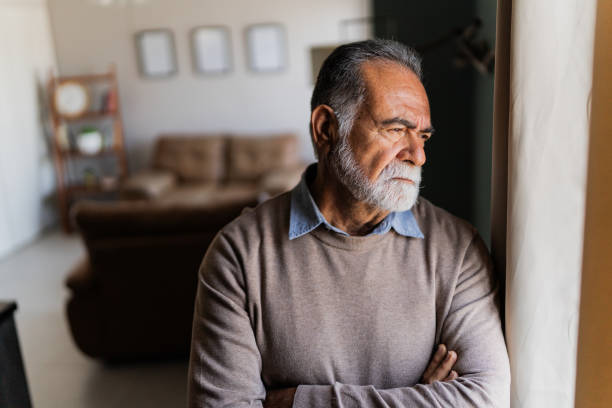Aging brings wisdom, resilience, and reflection—but it can also present emotional challenges. Seniors may face anxiety and depression due to factors like declining health, loss of loved ones, social isolation, or dramatic life changes such as retirement. Often overlooked, these mental health issues can quietly undermine a senior’s quality of life. But with the right support, understanding, and resources, managing anxiety and depression in older adults is both possible and effective.
Understanding Mental Health in Older Adults

Mental health in seniors is frequently misdiagnosed or untreated, partly because symptoms may appear subtly or be mistaken for other age-related concerns. Fatigue, irritability, memory issues, or even physical complaints can mask underlying depression or anxiety.
While aging itself doesn’t cause mental illness, seniors may be more vulnerable due to accumulated stressors. The death of a spouse, financial insecurities, or chronic medical conditions can become emotional triggers. In some cases, seniors hesitate to speak up, fearing stigma or not recognizing that their feelings are treatable. Early intervention, empathetic communication, and accessible resources can significantly improve mental well-being.
Promote a Supportive and Safe Environment
One of the most effective ways to help seniors manage anxiety and depression is by creating an environment that fosters emotional security and stability. Family members, caregivers, and healthcare professionals all play a role in this effort.
Ensure that the senior’s living space is both physically safe and emotionally comfortable. A clutter-free and well-lit home helps reduce stress and confusion. But beyond physical space, emotional safety is just as vital. Encourage open conversations. Let them know it’s okay to talk about their feelings without fear of judgment or dismissal.
Consistency and routine also play a big role in minimizing anxiety. Predictable daily schedules—meals at regular times, scheduled activities, medication routines—can help seniors feel more in control and less overwhelmed.
Encourage Social Engagement and Connection
Social isolation is a major contributor to anxiety and depression in older adults. Staying socially active can drastically improve a senior’s mood and mental resilience.
Encourage participation in community events, faith-based gatherings, or local senior center activities. Even something as simple as a weekly coffee date or video call with family can create a meaningful connection. If mobility is an issue, consider digital tools such as video chats or group messaging apps to maintain communication with loved ones.
Volunteering is another powerful outlet. It allows seniors to stay active, maintain a sense of purpose, and connect with others—all essential ingredients for emotional well-being.
Promote Physical Activity and Healthy Routines
Physical and mental health are deeply intertwined. Regular physical activity can ease symptoms of depression and anxiety by boosting endorphins, improving sleep, and enhancing overall energy levels.
Encourage seniors to engage in age-appropriate exercises such as walking, yoga, tai chi, or water aerobics. Even moderate activity can provide emotional benefits and reduce feelings of restlessness or helplessness.
A balanced diet and adequate hydration are equally important. Nutritional deficiencies, especially in Vitamin D, B12, and Omega-3s, can contribute to mood disorders. Encourage nutrient-rich meals and regular check-ins with a physician to address any dietary or metabolic concerns.
Make Mental Health Resources Accessible
Sometimes, professional help is necessary, and normalizing this need is critical. Cognitive behavioral therapy (CBT), talk therapy, and even medication (when managed properly) can all be part of a successful mental health treatment plan.
Encourage seniors to consult a mental health professional if symptoms persist for more than a couple of weeks. Look for therapists who specialize in geriatric care, as they are often more attuned to the unique emotional needs of older adults.
In rural or underserved areas, teletherapy options can provide much-needed access to mental health services. Be sure to check whether insurance, Medicare, or community programs offer coverage or subsidized options.
Teach Relaxation Techniques and Mindfulness
Mindfulness practices can help seniors manage anxiety and depression by anchoring their focus in the present. Breathing exercises, guided meditation, and gentle mindfulness routines are easy to learn and highly effective.
Consider introducing them to apps or YouTube videos with guided practices tailored for seniors. Alternatively, group classes in meditation or gentle yoga at community centers can also encourage social interaction while teaching valuable coping tools.
Journaling is another excellent technique, allowing seniors to process thoughts and feelings privately. Writing down what they’re grateful for, or simply noting the day’s experiences, can help reframe negative thinking patterns.
Support Through Empathy, Not Pity
Finally, how you approach a senior’s mental health matters. Treat their concerns with dignity and respect. Avoid minimizing their emotions or responding with pity. Instead, listen actively, validate their feelings, and offer steady, reassuring support.
Statements like “You’re not alone in this” or “Let’s find a way through together” foster trust and collaboration. Remember, seniors often have decades of experience managing life’s challenges—they may just need help rediscovering their inner resilience.
Final Thoughts
Helping seniors manage anxiety and depression isn’t about “fixing” them—it’s about walking alongside them with patience, compassion, and consistency. Whether through connection, routine, therapy, or a healthier lifestyle, the path to better mental health is achievable. By recognizing the signs early and acting with empathy, we can help our elders not only cope but thrive in their later years.


Recent Comments